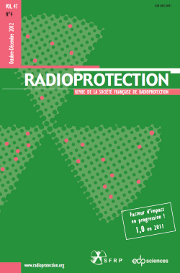No CrossRef data available.
Article contents
Updates to UK emergency and recovery advice following changesin international guidance
Published online by Cambridge University Press: 25 April 2013
Abstract
HPA is updating and consolidating its advice on radiation emergencies and recovery.Current advice was published in 1997. Since 2007, the ICRP has issued a set ofrecommendations to elaborate its guidance for emergency exposure and existing exposuresituations. It is expected that the European Basic Safety Standards, when published, willalso reflect the ICRP recommendations. The new ICRP guidance represents a marked change inapproach, with emphasis placed on optimisation of whole protection strategies usingreference levels of residual dose. These new concepts as well as the relevant lessonsidentified following the Fukushima accident will be included in the new UK advicedocument. The scope of the UK advice includes reactor and transport accidents as well asreleases from waste stores, reprocessing and defence activities. The revised advice willconsider the initiation of emergency countermeasures based on averted dose criteria andoptimisation of the subsequent protection strategy based on reference levels of residualdose. The advice will illustrate that the type of protection strategy selected depends onthe contribution of different exposure pathways over time to projected dose, and this willvary according to the scenarios considered as reasonably foreseeable. Due to the potentialimpact of the advice, a wide range of stakeholders are being consulted. In particular,feedback will be required on the potential for adapting current practices for shelteringand stable iodine prophylaxis to situations involving longer duration releases or thosewith a prolonged threat phase. The advice document will contain guidance for emergencyplanning and response, criteria for the withdrawal of emergency countermeasures, factorsto consider during the transition to an existing exposure situation and the management oflong term contaminated areas. It is the first time that the whole spectrum of advice willbe presented in a single publication, which is expected to be published in 2013, followinga public consultation process.
- Type
- Research Article
- Information
- Copyright
- © EDP Sciences, 2013


